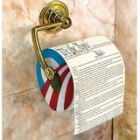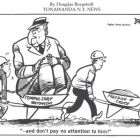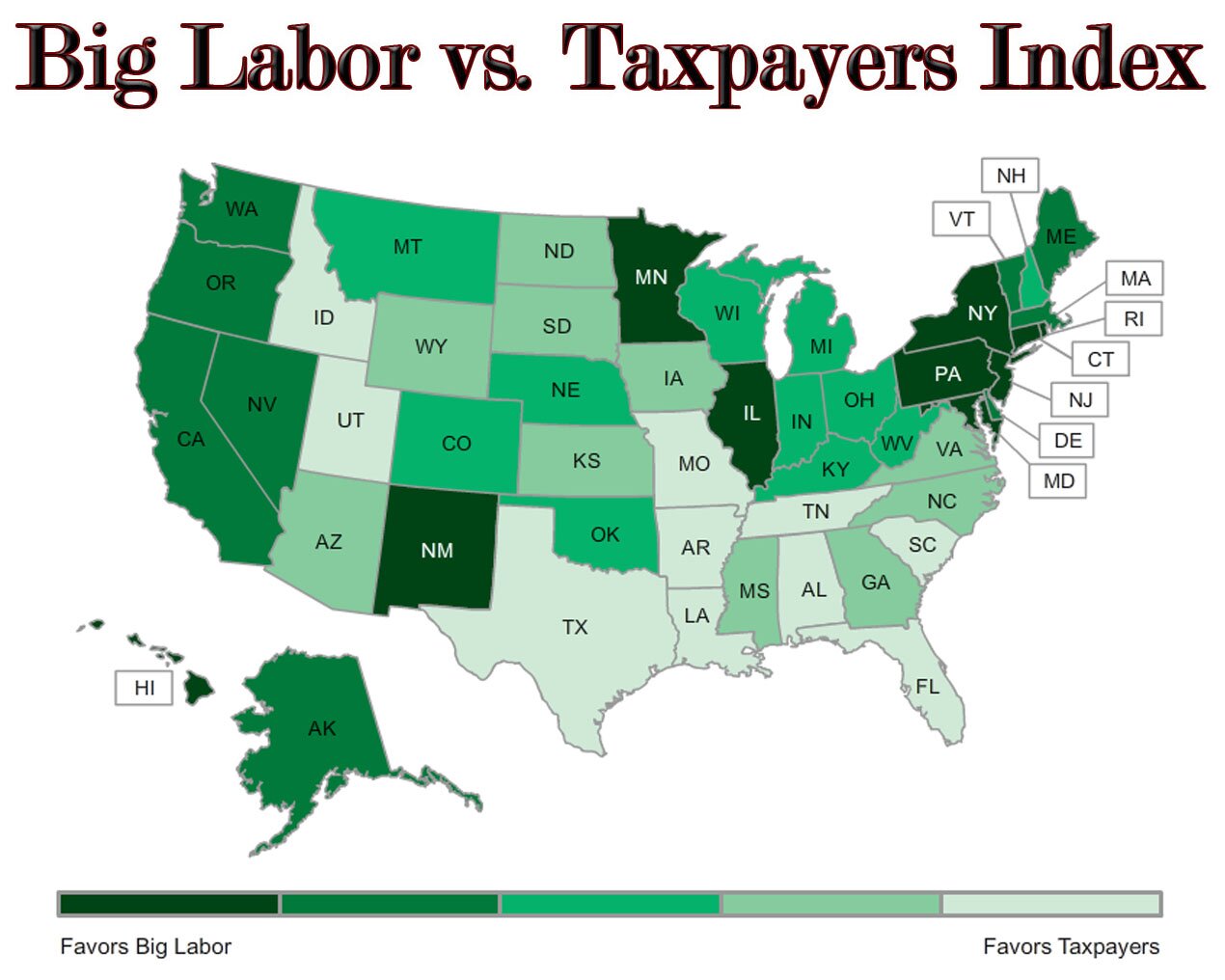Labor Facts
Government Sector Unions
Public sector unions are one of the key forces pushing for larger and more expensive government. Today, more union members work for government entities (7.9 million) than work for private businesses (7.4 million). The number of unionized government employees is likely to keep growing. Unlike private companies, elected officials have a political incentive to increase wages and benefits. These officials approve lavish collective bargaining agreements to appease public unions in part as payback to their supporters. The result is bigger government, higher taxes, and, in the case municipal bankruptcy of Vallejo, California, last year.
Read more on Government Sector Unions
Union Pension Underfunding
An alarming number of union pension funds in both the private and public sectors are actuarially unsound and thus will not likely be able to pay future retirees their promised benefits. This chronic underfunding is a serious and growing threat to the financial viability of both private businesses and state and local governments. Federal bailouts threaten to worsen this situation by making taxpayers liable for the reckless, profligate actions of a handful of pension fund managers—many of whom are union officials. CEI will work to oppose government pension bailouts and propose policies to safeguard retirement security for workers through financially sound pension reforms.
Read more on pension underfunding
Union Financial Transparency
The Obama administration has rescinded three regulations that required unions and their leaders to more specifically detail their finances—including political spending. The rules would have required union leaders to identify from whom they were buying and selling assets, file more detailed conflict-of-interest forms, and reveal the finances of hundreds of so-called labor trusts—largely unregulated entities set up to provide benefits for members. The repeal of these rules hampers union members’ and the public’s ability to monitor union spending, and makes it much more difficult to uncover any possible corruption.
Read more on union financial transparency
Davis Bacon and Project Labor Agreements
- Project Labor Agreements (PLAs) rig the contracting process for public construction projects to ensure that only unionized firms qualify, by imposing burdensome requirements on nonunion contractors. Under a PLA, an open shop contractor could be required to employ workers from union hiring halls, acquire apprentices from union apprentice programs, and require employees to pay union dues. PLAs result in more taxpayer dollars being spent on federal contracts due to higher labor costs. Costs can increase by as much as 20 percent for a given project. It also puts small businesses—including minority-owned businesses—at a disadvantage.
- The Davis-Bacon Act requires federal contractors to pay the “prevailing” wage in a given locality as determined by the Secretary of Labor. Because this has typically been equivalent to the prevailing union wage, the law makes it harder for non-union contractors to compete for those projects. A recent report by the Government Accountability Office shows that Davis-Bacon prevailing wage requirements caused delays for Recovery Act (stimulus) projects at the departments of Commerce, Energy, and Housing and Urban Development and at the Environmental Protection Agency.
- A policy named High Road Contracting is currently being considered by President Barack Obama. The Wall Street Journal has described High Road Contracting as “Davis-Bacon on steroids.” The policy would force companies to raise pay and benefits for workers if they want continued access to federal projects. It would require federal contracts be awarded to companies paying a “living wage”—in effect, a union wage. It would also steer contracts to companies with extravagant health care and retirement packages. The policy would give unions an unfair bidding advantage on the government’s $500 billion in annual contracts.
Read more on union contracting privileges
Right to Work
Right to work laws make unions more responsive to their members and help improve states’ business climates by removing Big Labor’s stranglehold on certain industries. In the 22 states that have enacted right to work laws, workers can choose whether they want to pay for union representation or not. However, in the other 28 states, workers at unionized companies who choose not to pay union dues may risk losing their jobs.
The Employee Free Choice Act
The so-called Employee Free Choice Act, in its current form, will effectively eliminate the secret ballot in union organizing elections, through a process known as card check. The arbitration section of EFCA will impose mandatory binding interest arbitration by a government bureaucrat within 120 days of a new local union being formed. The arbitration section could impose impractical, job-killing work rules on employers by government officials who are unfamiliar with those companies. A possible EFCA compromise would do away with the card check provision and allow union organizers access to an employer’s property. In addition to being an infringement on private property rights, this access could disrupt work and decrease productivity.
Read more on the Employee Free Choice Act
Electronic Card Check
Having failed to win congressional approval of the misleadingly named Employee Free Choice Act (EFCA), organized labor and its allies in the administration are now trying to enact EFCA-like regulations to skew the playing field in unions’ favor and undermine individual worker choice. The National Labor Relations Board (NLRB) is considering allowing electronic remote voting for union elections. While the NLRB claims these votes will be kept secret, union organizers may still be able to pressure individual workers to vote for the union on a laptop computer or other mobile electronic device. The NRLB is also considering allowing expedited elections, which are essentially ambush elections that do not afford employers a chance to respond to a union campaign.
 Free Market Policy Organizations Push Back against Stealth Unionization Campaign
Free Market Policy Organizations Push Back against Stealth Unionization Campaign
 Could Indiana’s Right to Work Law Mean Trouble For Neighboring States?
Could Indiana’s Right to Work Law Mean Trouble For Neighboring States?
 Wrong way, Illinois: Unemployment rate increased most in the nation in 2011
Wrong way, Illinois: Unemployment rate increased most in the nation in 2011
 Wisconsin union holding federal funds hostage
Wisconsin union holding federal funds hostage


